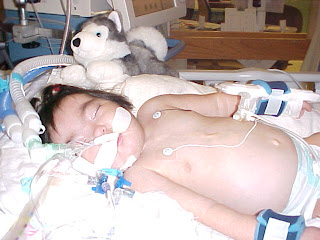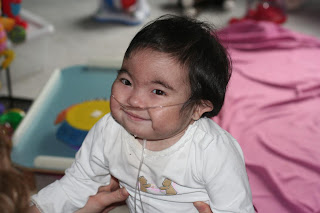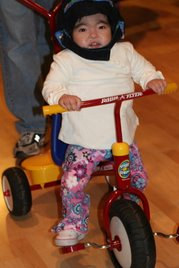
Here we are again. Mieko has been hospitalized at St. Paul Children's for more than a week. She has RSV, respiratory syncytial virus. This is the second year in a row and this time it's a very severe case. The docs are somewhat stumped since she gets injections of synagis. This isn't a vaccine, but it's supposed to keep you from being as severely effected. Last year Mieko had a much milder case and did not end up in the PICU. She's been on a ventilator for more than 10 days and has at least a couple more days to go. Luckily, she's on the mend and we're very comfortable with the care she's getting. Unfortunately, we've been through this before. Mieko's not always in the PICU, but she's usually in the hospital at least a couple of times each winter. We have a routine down.
Here's what I usually do when our world revolves around the hospital.
What we bring:
-list of medications incl. doses and times given
-feeding schedule incl. amounts and times
- extra clothes, toiletries
- cell phone chargers
- notebook
- small stuffed animals
- distractions--- for me it's knitting, for my hubby it's a palm pilot with electronic games, books, magazines, etc.
- photo or photo albums
I carry the med and feeding sheets with me all the time. It's really helpful, especially when you're sleep deprived and can't remember or don't feel like reciting all of those meds. While you're in the hospital it's also a good idea to check your child's medication list (MAR), so you can make sure everything's been transcribed correctly. If you want a med given at a certain time, let them know. Now, the stuffed animals may seem trivial, but not only do they bring comfort and familiarity, the nurses like to use them as little pillows to help prop things up in bed. Lastly, I like to put a smiling photo of Mieko on her bed so that the docs, nurses, and therapists can see what she's like when well. It gives us all a goal and I think everyone feels more connected to her. This time, I also brought a photo album showing her many activities. I think people really get a sense of her and that Trisomy 18 isn't the same for every kid.
Once you're admitted... most of your contact will be with your assigned nurse. The shifts can change every 8 hours, sometimes less and sometimes more. A resident will be assigned to your case. This doctor will check on your child daily and communicate with their supervising doc. Since these residents are continually rotating, you will probably never see the same one on subsequent visits. In my experience, they're very eager to please and communicate with parents. The St. Paul Clinic docs and specialists also round (check on the kids) if needed.
In the PICU, there are daily teaching rounds with the residents. The parents are always welcome in these discussions, but they might not go out of their way to invite you.
A few things to remember... dont' hesitate to speak up! If you don't understand something or don't like the way something's being done, let them know. If you don't feel comfortable talking with them directly, there is a family liaison representative at Children's. They work as an ombudsman as well if you have a complaint. Also, give yourself a chance to both rest and exercise. The hospital is a tiring place. A break to get outside or just walk around for a while can make a big difference. Even though we wish we didn't need this routine, it's nice to know so many familiar faces at Children's. We know she's in good hands . We feel like we know just about everyone. We hope the rest of this year, they'll see more of the healthy Mieko than the one lying in the hospital bed right now.
Here's what I usually do when our world revolves around the hospital.
What we bring:
-list of medications incl. doses and times given
-feeding schedule incl. amounts and times
- extra clothes, toiletries
- cell phone chargers
- notebook
- small stuffed animals
- distractions--- for me it's knitting, for my hubby it's a palm pilot with electronic games, books, magazines, etc.
- photo or photo albums
I carry the med and feeding sheets with me all the time. It's really helpful, especially when you're sleep deprived and can't remember or don't feel like reciting all of those meds. While you're in the hospital it's also a good idea to check your child's medication list (MAR), so you can make sure everything's been transcribed correctly. If you want a med given at a certain time, let them know. Now, the stuffed animals may seem trivial, but not only do they bring comfort and familiarity, the nurses like to use them as little pillows to help prop things up in bed. Lastly, I like to put a smiling photo of Mieko on her bed so that the docs, nurses, and therapists can see what she's like when well. It gives us all a goal and I think everyone feels more connected to her. This time, I also brought a photo album showing her many activities. I think people really get a sense of her and that Trisomy 18 isn't the same for every kid.
Once you're admitted... most of your contact will be with your assigned nurse. The shifts can change every 8 hours, sometimes less and sometimes more. A resident will be assigned to your case. This doctor will check on your child daily and communicate with their supervising doc. Since these residents are continually rotating, you will probably never see the same one on subsequent visits. In my experience, they're very eager to please and communicate with parents. The St. Paul Clinic docs and specialists also round (check on the kids) if needed.
In the PICU, there are daily teaching rounds with the residents. The parents are always welcome in these discussions, but they might not go out of their way to invite you.
A few things to remember... dont' hesitate to speak up! If you don't understand something or don't like the way something's being done, let them know. If you don't feel comfortable talking with them directly, there is a family liaison representative at Children's. They work as an ombudsman as well if you have a complaint. Also, give yourself a chance to both rest and exercise. The hospital is a tiring place. A break to get outside or just walk around for a while can make a big difference. Even though we wish we didn't need this routine, it's nice to know so many familiar faces at Children's. We know she's in good hands . We feel like we know just about everyone. We hope the rest of this year, they'll see more of the healthy Mieko than the one lying in the hospital bed right now.





